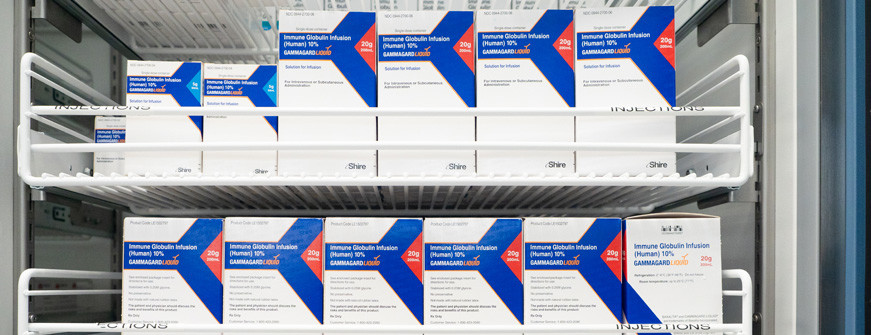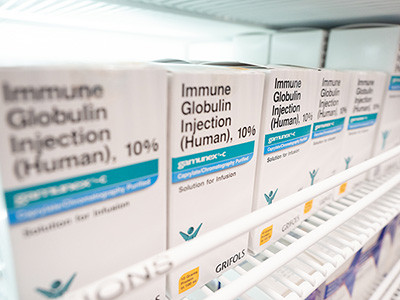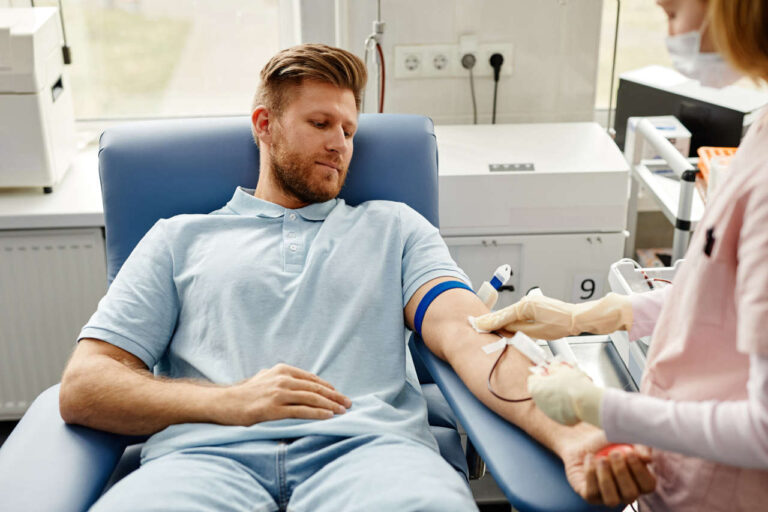
Immune globulin infusion (IVIG Infusion) is an IV-based treatment designed to help patients with weakened immune systems. IVIG treatment delivers antibodies directly to patients through IV to fight off infections and inflammation. Intravenous IG (IVIG) may produce mild to more severe side effects.
Immune globulin can be administered intravenously (IVIG) or subcutaneously (SCIG). If you have recently been approved for IVIG treatment, you may be curious about the potential side effects you may experience. Learning about what to expect after your IVIG treatment can help you decide if this treatment is right for you.
Speak to a Specialist about Copay Assistance
IVIG Treatment Side Effects
Although most recipients of IVIG handle the treatment quite well, some people do experience side effects.
Common Side Effects:
- Fever
- Headaches
- Aching muscles
- Nausea
- Stomach pains
Some may also experience an allergic reaction, typically caused by the added stabilizers and other inactive ingredients in the IVIG formula.
Rare Side Effects:
- Aseptic meningitis (inflammation of the brain)
- Liver problems
- Kidney failure
- Hemolytic anemia (a condition that destroys red blood cells)
Premedications such as aspirin and Benadryl are often administered before the procedure to address these known side effects.
Additionally, administering the immune globulin at a slower rate may help prevent or lessen the severity of these side effects.
Experienced infusion centers and nurses will often take precautions to prevent or help minimize any side effects before beginning treatment.
At Ameripharma, we have experienced and caring nurses that work hard to ensure your comfort and safety. Many patients don’t realize IVIG infusions can be done from the comfort of their home and may be covered by medical insurance.
Ask About IVIG Home Infusion
Pre and Post IVIG Treatment Medications
If you experience any of the side effects listed above, you may be given medications to alleviate the symptoms after your treatment session:
- Acetaminophen or Ibuprofen is often given to relieve headaches and fever symptoms, including high body temperatures and body aches.
- Anti-nausea medication can be given to help with nausea and vomiting.
- Benadryl is also commonly administered in the presence of anaphylactic symptoms, including hives, rashes, and shortness of breath.
Logging Your Results

Ig is created from the extracted antibodies of thousands of blood donors, and each manufacturer produces the end product with its own unique blend of stabilizers and liquids.
Because of these variables, your body may react differently during each infusion session.
It is important to log the side effects (or lack of) that you experience after each infusion so that your doctor can adjust your regimen.
Adjusting Your Regimen:
- Slowing down your infusion rate.
- Recommending an alternative brand.
- Switching to SCIG.
These can all affect how your body responds to the infusion, and understanding how these factors come into play can help you prepare for future treatments.
According to Immune Deficiency Foundation, half of the infused immune globulin is metabolized within a 3 to 4 week period.
Since IVIG is meant to infuse larger amounts of Ig, patients can normally go 3 to 4 weeks between treatments.
SCIG, on the other hand, delivers smaller amounts of Ig and takes longer to be absorbed, which often requires more frequent infusion intervals ranging from daily to weekly.
When Can I See the Results?

IVIG patients often begin to see results from their treatments anywhere from 6 months to a year.
During this time, your doctor will closely monitor and track to see if there are improvements in relieving the symptoms associated with your primary diagnosis.
Log Your Symptoms
Logging how your body feels immediately after and between your infusion sessions can help your doctor prescribe the best course of treatment to support your needs. If you experience weakness between your IVIG infusion sessions, your doctor may recommend switching to SCIG.
Each individual will respond differently to IVIG. Many patients may experience no side effects, while others may experience mild to moderate side effects. Do not suffer in silence — speak up, and let your healthcare professionals know of any discomfort or concerns that you may have.
Regardless of the side effects, the benefits of IVIG and SCIG treatment generally outweigh any temporary discomfort you may experience. Feel free to book a call with a specialist if you have any questions. For copay assistance or to speak with our leadership team, click here.













